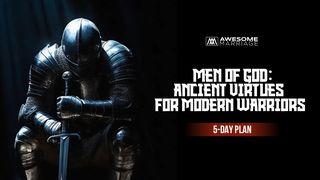Father AbrahamSample

Pointing to Christ, Christ as Seed: Galatians 3:1-18
With the singularity of the seed of Abraham in mind, we should now turn to the teaching that Christ is the seed of Abraham. Consider again what the apostle said in Galatians 3:16:
The promises were spoken to Abraham and to his seed. The Scripture does not say “and to seeds,” meaning many people, but “and to your seed,” meaning one person, who is Christ.
In this passage Paul not only drew attention to the fact that the seed of Abraham was singular but that the one seed of Abraham is Christ. Now, as we have already seen, in terms of the original meaning of Genesis the singular seed of Abraham of whom Moses wrote was none other than Isaac, the special son of promise born to Sarah. How then should we understand Paul when he wrote that Abraham’s one seed is Jesus?
Think of it this way. Abraham’s inheritance was a family inheritance that belongs to his descendants. But at a number of crucial points in the history of Scripture, God chose several key figures to serve as special heirs who received and distributed Abraham’s inheritance to others. In the case of Isaac, he was the special seed in distinction from Abraham’s other sons. When Isaac had two sons, Jacob and Esau, God chose Jacob to be the special seed of Abraham and excluded Esau and his descendants. From Jacob came the twelve patriarchs of the tribes of Israel. But among the tribes of Israel several figures were special heirs of Abraham. Moses, for instance, was the leader and mediator of God’s people as they moved from Egypt to the Promised Land. And later, as Israel became a full fledge empire, David and his sons held the special role of mediating the inheritance of Abraham.
It is this special role of David and his sons that led Paul to refer to Christ as the last great seed of Abraham because Jesus is the rightful heir of David’s throne. He was chosen by God to be the permanent king of his people. He is the great eternal royal seed of Abraham, the Messiah. And as such, Christ is the only one through whom anyone else can participate in Abraham’s inheritance. No one separated from Christ will ever receive the promises of Abraham.
So, we can summarize Jesus in relation to Abraham in this way. From a Christian point of view, Jesus is the unique, final seed of Abraham. And as Christians when we want to apply the life of Abraham to the modern world, we must always keep in mind that the connection between Abraham and our world is that Abraham’s great blessings are passed to Christ as he inaugurated his kingdom, as he continues to build his kingdom now and as he will bring his kingdom to its consummation.
The New Testament teaches that Christ receives and distributes Abraham’s inheritance in three main stages. First, in the inauguration of his kingdom that occurred in his first coming; second, in the continuation of his kingdom that extends to all of history after his first coming but prior to his return; and third, at the consummation of his kingdom in his glorious second coming. He continues to receive and distribute Abraham’s inheritance in increasing measure as he reigns over all at the right hand of God the Father. And he will one day fully receive and fully distribute Abraham’s inheritance when he returns in glory.
In a word, it is important to realize that in Galatians 3:16 Paul encapsulated a rather complex theological outlook in just a few words. When Paul said that the promise was to Abraham and his singular seed, and then identified that seed as Christ, he was not saying that the word “seed” in Genesis referred directly to Jesus. Instead, Paul spoke in an abbreviated fashion of a typology that exists between Isaac and Christ. To state the matter more fully, we could put it this way: like Isaac was the chief heir of Abraham in his generation, Christ is Abraham’s greatest son, and the chief heir of Abraham in the New Testament age.
Click here to watch Father Abraham video series. thirdmill.org
Scripture
About this Plan

This reading plan explores the account of Abraham's life in Genesis from a distinctly Christian perspective in order to answer questions such as: What did these stories mean for those who first received them? And what do they mean for us today?
More
Related plans

Overcoming Suffering

Alive and on Fire - a Video Devo With Illusionist, Dustin Tavella

Men of God: Ancient Virtues for Modern Warriors

Be Still and Know: 7 Days to Recenter Your Heart on God

From Acceptance to Approval: Living a Life That Pleases the Father

Be Ye Holy: The Holy Spirit's Role in Our Lives

Healing From God

Unmasking Narcissism

Living With a Strong-Willed Child
